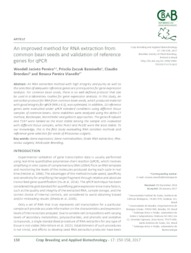An improved method for RNA extraction from common bean seeds and validation of reference genes for qPCR.
An improved method for RNA extraction from common bean seeds and validation of reference genes for qPCR.
Author(s): PEREIRA, W. J.; BASSINELLO, P. Z.; BRONDANI, C.; VIANELLO, R. P.
Summary: An RNA extraction method with high integrity and purity as well as the selection of adequate reference genes are prerequisites for gene expression analysis. For common bean seeds, there is no well-defined protocol that can be used in a laboratory routine for gene expression analysis. In this study, an extraction protocol for RNA from common bean seeds, which produced material with good integrity for qPCR (RIN ≥ 6.5), was optimized. In addition, 10 reference genes were evaluated under qPCR standard conditions using different tissue samples of common beans. Gene stabilities were analyzed using the delta-CT method, Bestkeeper, NormFinder and geNorm approaches. The genes β-tubulin and T197 were ranked as the most stable among the sample sets evaluated with different tissue samples, while PvAct and Pv18S were the least stable. To our knowledge, this is the first study evaluating RNA isolation methods and reference gene selection for seeds of Phaseolus vulgaris.
Publication year: 2017
Types of publication: Journal article
Unit: Embrapa Rice & Beans
Observation
Some of Embrapa's publications are published as ePub files. To read them, use or download one of the following free software options to your computer or mobile device. Android: Google Play Books; IOS: iBooks; Windows and Linux: Calibre.
Access other publications
Access the Agricultural Research Database (BDPA) to consult Embrapa's full library collection and records.
Visit Embrapa Bookstore to purchase books and other publications sold by Embrapa.

